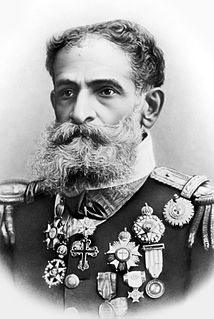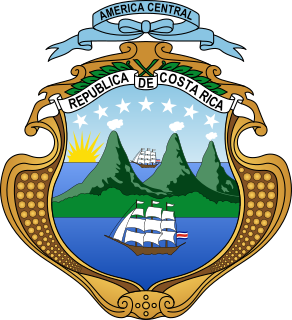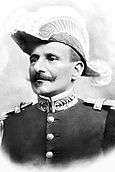
Manuel Deodoro da Fonseca was a Brazilian politician and military officer who served as the first President of Brazil. He took office after heading a military coup that deposed Emperor Pedro II and proclaimed the Republic in 1889, disestablishing the Empire, and stepped down little more than two years later, in 1891, under great political pressure. He is therefore the first Brazilian President to have resigned from office.
The Liberal Party of Andorra is a liberal and conservative-liberal political party in Andorra. It is a member of the Liberal International and the Alliance of Liberals and Democrats for Europe.
The Autonomist Liberal Party, renamed usually semplified in Liberal Party in 1898, was one of major parties from 1910 until the Cuban Revolution the late 1950s, when it was exiled.

General elections were held in El Salvador on 20 March 1994, with a second round of the presidential elections taking place on 24 April. Armando Calderón Sol of the Nationalist Republican Alliance won the presidential elections, whilst his party also won the legislative elections. Voter turnout was 50% in the first round of the presidential elections and 45.5% in the second, whilst it was 53.1% for the legislative election.

Early presidential elections were held in Brazil on 13 April 1919, following the death of Rodrigues Alves, who had been elected the previous year. The result was a victory for Epitácio Pessoa of the Paraíba Republican Party, who received 71.0% of the vote.

General elections were held in Turkey on 21 July 1946, the first multi-party elections in the country's history. The multiple non-transferable vote electoral system was used. The result was a victory for the Republican People's Party, which won 395 of the 465 seats.

General elections were held in Costa Rica on 7 December 1913, the first direct elections since 1844. They were also the first elections to have universal male suffrage, after economic and educational requirements were eliminated. Máximo Fernández Alvarado of the Republican Party won the presidential election, but both he and runner-up Carlos Durán Cartín later resigned and Alfredo González Flores was appointed president by Congress on 8 May 1914. The Republican Party also won the parliamentary election. Voter turnout was 78.0% in the presidential election and 78.6% in the parliamentary election.

General elections were held in Costa Rica on 12 February 1928. Cleto González Víquez of the National Union won the presidential election, whilst the party also won the parliamentary election, in which they received 53.3% of the vote. Voter turnout was 62.5% in the presidential election and 72.85% in the parliamentary election.

General elections were held in Costa Rica on 14 February 1932. Ricardo Jiménez Oreamuno of the Independent National Republican Party won the presidential election, whilst the party also won the parliamentary election, in which they received 46.7% of the vote. Voter turnout was 64.2%.

General elections were held in Costa Rica on 9 February 1936. León Cortés Castro of the Independent National Republican Party won the presidential election, whilst the party also won the parliamentary election, in which they received 59.4% of the vote. Voter turnout was 68.8% in the presidential election and 68.9% in the parliamentary election.

General elections were held in Costa Rica on 11 February 1940. Rafael Ángel Calderón Guardia of the Independent National Republican Party won the presidential election. Voter turnout was 80.8% in the presidential election and 65.6% in the parliamentary election.

General elections were held in Costa Rica on 6 February 1994. José María Figueres of the National Liberation Party won the presidential election, whilst his party also won the parliamentary election. Voter turnout was 81.1%.

General elections were held in Cuba on 1 November 1954. Fulgencio Batista won the presidential election running under the National Progressive Coalition banner, whilst the main opposition candidate, Ramón Grau San Martín, withdrew his candidacy before election day. Progressive Action Party emerged as the largest party in the House of Representatives, winning 60 of the 130 seats. Voter turnout was 52.4%.

General elections were held in Portugal on 28 April 1918, following a coup by Sidónio Pais in December 1917. The elections were boycotted by the Democratic Party, the Evolutionist Party and the Republican Union, who had won over 90% of the seats in the 1915 elections.
The Republican Movement was a political party in Switzerland between 1971 and 1989.

Events in the year 1910 in Brazil.

Events in the year 1914 in Brazil.

The Republican Evolutionist Party, commonly known as the Evolutionist Party, was a political party in Portugal led by António José de Almeida.

The Republican Union Party, commonly known as the Republican Union or the Unionist Party, was a political party in Portugal.

The Republican Party of National Reconstitution, commonly known as the Reconstitution Party, was a political party in Portugal














